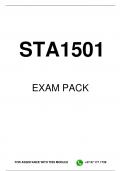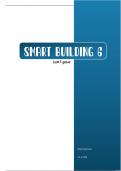Tentamen (uitwerkingen)
STA1501 EXAM PACK 2024
- Vak
- Instelling
- Boek
STA1501 Latest exam pack questions and answers and summarized notes for exam preparation. Updated for 2024 exams . For assistance Whats-App.0.6.7..1.7.1..1.7.3.9 . All the best on your exams!!
[Meer zien]




